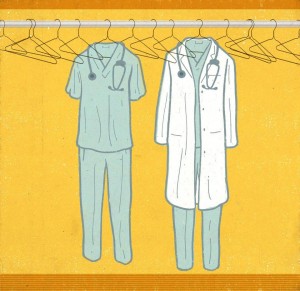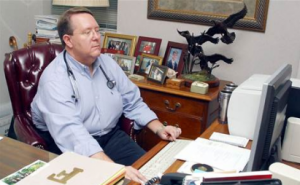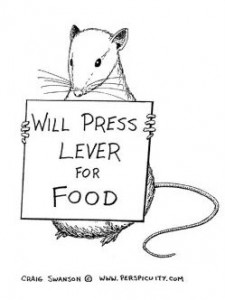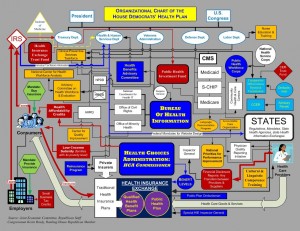May 19th, 2013 by Dr. Val Jones in Opinion
2 Comments »

Image Credit: Dan Page, Boston Globe
What is the US going to do about our current and future primary care physician shortage? Many believe that the solution is to expand the scope of nursing practice, and license non-physicians (such as naturopaths) to practice medicine. In the face of scarcity, 17 states have licensed naturopaths to provide primary care and nurse-led, in-store pharmacy clinics are gaining popularity.
Studies have shown that nurse practitioners are as capable as physicians at treating common primary care complaints such as strep throat and headache. What studies have NOT shown is that nurse practitioners recognize and diagnose less common diseases with similar symptoms. What if the strep throat were throat cancer? What if the headache were meningitis? Substituting practitioners with half the training and experience of an MD comes at a price. And that price may include missed diagnoses, delay of appropriate treatment, and life threatening consequences.
But the lure of cost savings cannot be ignored. Nurses are paid less to practice primary care, so in theory we could save untold millions each year by having patients see nurses instead of doctors. That sounds good, but now nurse practitioners are lobbying to receive the same salary as MDs for their time. After all, they’re doing the same work, right? Never mind that everyone they treat must be squeezed into a limited set of diagnosis codes – when all you have is a hammer, then everything starts looking like a nail. “Poof” goes the savings, while care quality standards are permanently reduced by forced limitations on differential diagnoses.
A better solution would be to find ways to extend physician reach and expertise with telemedicine platforms, longer patient visit times, and by reducing their non-clinical practice burden. Nurses and ancillary providers are valued members of the clinical team who are dearly loved by patients and doctors alike, but they simply do not have enough training to be ruling out tens of thousands of rare diseases and conditions. This is why we need physicians at the helm of the clinical team – to make sure that patients are on the right treatment pathway.
Some nurses cry “prejudice” when physicians suggest that MDs provide better primary care. But we all know that knowledge and experience are a critical asset when lives are at stake. As the research results begin to roll in regarding better patient outcomes under the care of physicians versus nurse practitioners, common sense tells us that outsourcing primary care to the less qualified will have undesirable consequences for some. And if you choose to get your primary care from a naturopath or nurse, you’ d better hope that headache isn’t anything serious. Because a little savings now could cost you your life.
May 2nd, 2013 by Dr. Val Jones in Health Tips, Opinion, Research
No Comments »
 A recent, 358-person survey conducted by researchers at Yale University (and published in the International Journal of Obesity) suggested that patients may be less likely to follow the medical advice of overweight and obese physicians. Survey respondents were 57% female, 70% Caucasian, 51% had BMIs in the normal or underweight category (31% overweight and 17% obese), and were an average age of 37 years old.
A recent, 358-person survey conducted by researchers at Yale University (and published in the International Journal of Obesity) suggested that patients may be less likely to follow the medical advice of overweight and obese physicians. Survey respondents were 57% female, 70% Caucasian, 51% had BMIs in the normal or underweight category (31% overweight and 17% obese), and were an average age of 37 years old.
Respondents rated overweight and obese physicians as less credible than normal weight doctors, and stated that they would be less likely to follow advice (including guidance about diet, exercise, smoking cessation, preventive health screenings, and medication compliance) from such physicians. Although credibility and trust scores differed between the hypothetical overweight and obese providers and normal weight colleagues, the respondents predicted less of a difference between them in terms of empathy and bedside manner. Respondents said they’d be more likely to switch physicians based on their weight alone. There was no less bias against overweight and obese physicians found in respondents who were themselves overweight or obese.
The study authors note that this survey is the first of its kind – assessing potential weight bias against physicians by patients of different weights. Previous studies (by Puhl, Heuer, and others) have documented weight bias against patients by physicians.
While the study has some significant limitations (such as the respondents being disproportionately Caucasian, thin, and female), I think it raises some interesting questions about weight bias and physicians’ ability to influence patients to adopt healthier lifestyles.
Considering the expansion of pay-for-performance measures (where physicians receive higher compensation from Medicare/Medicaid when their patients achieve certain health goals -such as improved blood sugar levels), being overweight or obese could reduce practice profit margins. If patients are less likely to follow advice from overweight or obese doctors, then it stands to reason that patients’ health outcomes could suffer along with the doctors’ income.
I’m certainly not suggesting that CMS monitor physician waist circumferences in an attempt to improve patient compliance with healthy lifestyle choices (Oh no, did I just give the bureaucrats a new regulatory idea?), but rather that physicians redouble their efforts to practice what they preach as part of a commitment to being good clinicians.
Some will say that the problem here is not expanding provider waistlines, but bias against the overweight and obese. While I agree that weight has little to do with intellectual competence, it does have to do with disease risk. Normalizing and destigmatizing unhealthiness is not the way to solve the weight bias problem. We know instinctively that carrying around a lot of extra pounds is damaging to our health. It’s important to show grace and kindness to one another as we join together on the same health journey – a struggle to make good lifestyle choices in a challenging environment that tempts us to eat poorly and cease exercising.
To doctors I say, let’s fight the good fight and model healthy behaviors to our patients. To patients I say, show grace to your doctors who carry extra pounds – don’t assume that they are less competent or knowledgeable because of a weight problem. And to thin, female, 30-something, Caucasian survey respondents I say – Wait till you hit menopause before you judge people who are overweight! 😉
November 28th, 2012 by Dr. Val Jones in Health Policy, Opinion, Primary Care Wednesdays
No Comments »
 Animal research has shown that the best way to get a rat to press a pellet-producing lever is to set the mechanism so that it doesn’t always release a pellet with each push. The unpredictability (or scarcity) of the reward causes the rat to seek it with more fervor. Casino owners are well aware of this phenomenon, gaming our brain’s natural wiring so that our occasional wins drive us to lose more than we would if our winning had a predictable pattern.
Animal research has shown that the best way to get a rat to press a pellet-producing lever is to set the mechanism so that it doesn’t always release a pellet with each push. The unpredictability (or scarcity) of the reward causes the rat to seek it with more fervor. Casino owners are well aware of this phenomenon, gaming our brain’s natural wiring so that our occasional wins drive us to lose more than we would if our winning had a predictable pattern.
I believe that the same principle is at work in physician reimbursement. Although most patients don’t realize this, physicians aren’t always paid for the work they do, and they are paid wildly different rates depending on how they code an encounter or procedure. After several health insurance denials of payment for legitimate work, physicians look for ways to offset their losses. Those may include changing the coding of their procedures to enhance the rate of reimbursement, exaggerating the complexity of an encounter, or (less commonly) billing for things they didn’t do. Because of the perceived injustice in a system that randomly denies payment for legitimate work, the physician feels less morally concerned about her over billing and coding foibles.
And so a vicious cycle of reimbursement deprivation, followed by fraud and abuse, becomes the norm in the U.S. healthcare system. Payers say that physicians are greedy and unethical, and physicians say that payers deny reimbursement unfairly and pay rates that are too low to be sustainable. The government’s response is to hire a cadre of auditors to ferret out physician fraud while cutting reimbursement to physicians further. This is similar to reducing the rate of pellet release to the rats in the Skinner boxes, while randomly electrocuting them through the metal flooring. The result will be that rats will work harder to find work-arounds to get their pellets, including gathering together into larger groups to share pellets. This is occurring more and more commonly as solo practitioners are joining hospitals or large group practices to make ends meet.
But we need to realize a few things about the “Skinner box healthcare system:”
1. Rats are not evil because they press levers manically when there is a scarcity of pellets. Physicians are not evil when they look for ways to make up lost revenue. While fraud and abuse are always wrong, it is not surprising that they are flourishing in an environment of decreasing reimbursement and increasing health insurance payment denials. If we want to address fraud and abuse, we need to understand why it’s happening so that our “solutions” (i.e. hiring thousands more government auditors to investigate medical practices) don’t end up being as useless as shocking the rats.
2. Health insurance (whether public or private) is not evil for trying to rein in costs. Payers are in the unenviable position of having to say “no” to certain expenditures, especially if they are of marginal benefit. With rats pressing levers at faster and faster rates for smaller and smaller pellets, all manner of cost containment mechanisms are being applied. Unfortunately they are instituted randomly and in covert manners (such as coding tricks and bureaucratic red tape) which makes the rats all the more manic. Not to mention that expensive technology is advancing at a dizzying rate, and direct-to-consumer advertising drives demand for the latest and greatest robot procedure or biotech drug. Costs are skyrocketing for a number of good and bad reasons.
3. There is a way out of the Skinner box for those primary care physicians brave enough to venture out. Insurance-free practices instantly remove one’s dietary reliance on pellets, therefore eliminating the whole lever pressing game. I joined such a practice several years ago. As I have argued many times before, buying health insurance for primary care needs is like buying car insurance for your windshield wipers. It’s overkill. Paying cash for your primary care allows you to save money on monthly insurance premiums (high deductible plans cost much less per month) and frees up your physician to care for you anywhere, anytime. There is no need to go to the doctor’s office just so that they can justify billing your insurance. Pay them for their time instead (whether by phone, in-person, or at your home/place of business) and you’ll be amazed at the convenience and efficiency derived from cutting out the middle men!
Conclusion: The solution to primary care woes is to think outside the box. Patient demand is the only limiting factor in the growth of the direct-pay market. Patients need to realize that they are not limited to seeing “only the physicians on their health insurance list” – there is another world out there where doctors make house calls, solve your problems on the phone, and can take care of you via Skype anywhere in the world. Patients have the power to set physicians free from their crazy pellet-oriented existence by paying cash for their health basics while purchasing a less expensive health insurance plan to cover catastrophic events. Saving primary care physicians from dependency on the insurance model is the surest path to quality, affordable healthcare for the majority of Americans. Will you join the movement?
November 9th, 2012 by Dr. Val Jones in Health Policy, Humor, Opinion
4 Comments »
 If you live in a small town or rural area of the United States, you may have noticed that family doctors are becoming an endangered species. Private and public health insurance reimbursement rates are so low that survival as a solo practitioner (without the economies of scale of a large group practice or hospital system) is next to impossible. Some primary care physicians are staying afloat by refusing to accept insurance – this allows them the freedom to practice medicine that is in the patient’s best interest, rather than tied to reimbursement requirements.
If you live in a small town or rural area of the United States, you may have noticed that family doctors are becoming an endangered species. Private and public health insurance reimbursement rates are so low that survival as a solo practitioner (without the economies of scale of a large group practice or hospital system) is next to impossible. Some primary care physicians are staying afloat by refusing to accept insurance – this allows them the freedom to practice medicine that is in the patient’s best interest, rather than tied to reimbursement requirements.
I joined such a practice a few years ago. We make house calls, answer our own phones, solve at least a third of our patients’ problems via phone (we don’t have to make our patients come into the office so that we can bill their insurer for the work we do), and have low overhead because we don’t need to hire a coding and billing team to get our invoices paid. Our patients love the convenience of same day office visits, electronic prescription refills, and us coming to their house or place of business as needed.
Using health insurance to pay for primary care is like buying car insurance for your windshield wipers. The bureaucracy involved raises costs to a ridiculously unreasonable level. I wish that more Americans would decide to pay cash for primary care and buy a high deductible health plan to cover catastrophic events. But until they do, economic pressures will force primary care physicians into hospital systems and large group practices. My friend and fellow blogger Dr. Doug Farrago likens this process to being “assimilated by the Borg.”
Doug offered a challenge to his readers – to customize the definition of Star Trek’s Borg species to today’s healthcare players. I gave it my best shot. Do you have a better version?
Who are the Borg:
The Borg are a collection of alien species that have turned into cybernetic organisms functioning as drones of the collective or the hive. A pseudo-race, dwelling in the Star Trek universe, the Borg take other species by force into the collective and connect them to “the hive mind”; the act is called assimilation and entails violence, abductions, and injections of cybernetic implants. The Borg’s ultimate goal is “achieving perfection”.
My attempt to customize the definition:
Hospitalists are a collection of primary care physicians that have turned into cybernetic organisms functioning as drones of the collective or hive. Hive collective administrators (HCAs), in association with partnered alien species drawn from the insurance industry and government, take other primary care physicians by economic force and connect them to “the hive mind”; the act is called assimilation and entails crippling reimbursement cuts, massive increases in documentation requirements, oppressive professional liability insurance rates, punitive bureaucratic legislation, and threat of imprisonment for failure to adhere to laws that HCA- partnered species interpret however they wish. The HCAs’ ultimate goal is “achieving perfect dependency” first for the drones, then for their patients, so that HCAs and their alien partners will become all powerful – dictating how neighboring species live, breathe, and conduct their affairs. Resistance is futile.
***
To learn more about my insurance-free medical practice, please click here. We can unplug you from the Borg ship!
October 15th, 2012 by Dr. Val Jones in Health Policy, Health Tips, True Stories
5 Comments »
 From a health perspective, I am grateful to be doing well. I have only one active medical condition that is fully treated by one prescription medicine. I have been taking this medicine since I was 18 years old. I recently bought myself a personal health insurance plan (my first that was not tied to employment) and simply wanted to resume regular purchase and use of my medicine.
From a health perspective, I am grateful to be doing well. I have only one active medical condition that is fully treated by one prescription medicine. I have been taking this medicine since I was 18 years old. I recently bought myself a personal health insurance plan (my first that was not tied to employment) and simply wanted to resume regular purchase and use of my medicine.
I was pleased to note that purchasing my medicine through the new insurance plan would save me a little bit of money (about $25/month). So I presented my card at the local pharmacy and was told that my medicine was not covered under my plan without pre-authorization from my doctor. I called my pharmacy benefits hotline and had them send a pre-auth form to my doctor. Then I asked him to fill out the form and fax it back. That was over three months ago.
When I called to inquire about the pre-auth forms, the benefits folks told me that they had no record of the fax. So I asked my doctor to send another fax form and I waited another week. When I called the benefits people, they again said that they had no record of the pre-auth documentation. They also said that I could not be transferred to the pre-auth team to figure out why it was missing (wrong fax number perhaps?) because they only speak to providers.
So out of curiosity I asked what the usual process was for obtaining a prescription medication once it has been authorized. The benefits staff didn’t know. I asked who would know and they said that only the “experts” in the pre-auth department know how medications are obtained by the member after being approved. I wondered how I’d ever figure this out if I wasn’t allowed to speak to them and I was told that I might be able to get an answer if I asked a customer care representative to request information on my behalf from the pre-auth experts. But… the pre-auth team was not in the office at the moment and I’d need to call back on Monday. (Parenthetically, the team is physically located in Pittsburgh, Pennsylvania, though I’m a member in Charleston, South Carolina.)
I asked the benefits team if they generally mail members their meds (I had heard this was the case) or if I could pick them up at my local pharmacy (my preference). They said they didn’t know, but I could call customer care on Monday.
So far, my experience with my new plan – to save $25 dollars/month on one prescription – has cost me 3 months and 1 week of waiting time, two form completion episodes with my doctor, discussions with several pharmacy benefits reps in a state far away from where I live, denial of communication with the only people who know what’s potentially holding up my prescription approval, and about a half hour of completely unhelpful discussion of basic prescription drug purchasing processes that staff at the drug benefits company themselves don’t understand.
And I’m healthy, I’m a healthcare provider who knows how to navigate the system, and I only need one prescription. What do sick people do? (I know, it’s awful out there.)
Life was much simpler when I paid for my medication out-of-pocket without an insurance middle man. I have often wondered if health insurance bureaucracy is purposefully designed to wear patients down to the point where they’ll just pay for things themselves rather than experience the pain associated with getting an insurance company to cover their portion of the cost. (The only other explanation is that health insurance company ineptitude comes from being administrative behemoths with too many moving parts and processes). It’s probably a mix of the two. Or maybe the latter supports the former so there’s no real incentive to pursue true efficiency.
But one thing I did notice – the insurance company was incredibly efficient at figuring out how to direct debit my premiums within 24 hours of signing up for the plan, and have increased my premium once already – by about $25 a month.
You can’t win, my friends.
If you’re healthy, get yourself a high deductible plan, pay as little in premiums as possible, and sock away some money in case of a catastrophic event. Pay cash for your primary care, and do whatever you can to stay healthy and out of the hospital. That’s my plan and I’m sticking to it.
***
Update: My medicine was finally approved/authorized, but I was informed that my doctor would need to send a new Rx form to them before I could receive my prescription. The Rx needed to be on their company’s form, so they had to fax him the request first. I asked how I would pay for the prescription and where I could pick it up and was informed that I’d save about 15% if I agreed to have the medicine mailed to my home (but delivery would take 2 extra weeks).
So I agreed to have it mailed to my home and offered to give them my credit card. They said I should call back with it once my doctor’s Rx had been received. I asked them how I would know when that had occurred. They said that they couldn’t call me to tell me when the Rx had arrived because I had selected “text messaging” as my preferred method of contact, and they don’t inform members of Rx form receipt via text messaging. So I agreed to switch my preference to calls (instead of text), and now I’ll probably get automated prescription refill information in the form of incoming calls on my personal work phone from now till I die. That’s if they don’t sell my phone number to telemarketers in the mean time.
And how annoying is it for my doctor to have sent out two faxes and one new Rx form for ONE prescription (not to mention reading the email explanations from me regarding correct pharmacy benefits plan form usage)? He was uncompensated for his time in this matter…





 If you live in a small town or rural area of the United States, you may have noticed that family doctors are becoming an endangered species. Private and public health insurance reimbursement rates are so low that survival as a solo practitioner (without the economies of scale of a large group practice or hospital system) is next to impossible. Some primary care physicians are staying afloat by refusing to accept insurance – this allows them the freedom to practice medicine that is in the patient’s best interest, rather than tied to reimbursement requirements.
If you live in a small town or rural area of the United States, you may have noticed that family doctors are becoming an endangered species. Private and public health insurance reimbursement rates are so low that survival as a solo practitioner (without the economies of scale of a large group practice or hospital system) is next to impossible. Some primary care physicians are staying afloat by refusing to accept insurance – this allows them the freedom to practice medicine that is in the patient’s best interest, rather than tied to reimbursement requirements.








